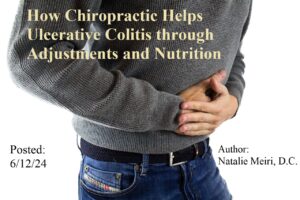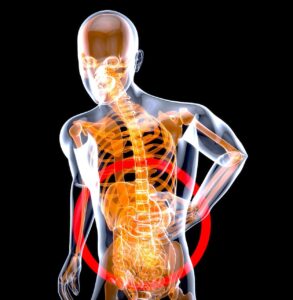
Ulcerative colitis is a chronic, inflammatory bowel disease that causes inflammation in the digestive tract. It is usually only in the innermost lining of the large intestine (colon) and rectum. Again, the cause is attributed to autoimmune disease.
Symptoms include episodic cramping and bloody diarrhea, pain, gas, bloating, and, at times, hard stools. Then your muscles have to work harder to move these hardened stools. Finally, all this can cause the mucous membrane lining of the colon wall to bulge out into small pouchlike projections called diverticula. In addition, it may be accompanied by systemic (whole body) symptoms. Read on to find out How Chiropractic Helps Ulcerative Colitis through Adjustments and Nutrition.
More on Ulcerative Colitis
Ulcerative colitis is more common in younger adults (15 – 30 years old). And there is a high risk for future colon cancer. There usually is a family history and it is equally common for men and women. As mentioned above, the cause is unknown. However, possible contributing factors include poor eating habits, stress, and food allergies. Furthermore, Colitis can also be caused by infectious agents such as bacteria. This type of colitis is often associated with the use of antibiotics. Over use of antibiotics can alter the normal bowel flora. Eventually this allows microorganisms that are normally in balance in your gut to multiply. Ulcerative colitis can range from relatively mild to severe. Common complications cause symptoms of fatigue, weight loss, dehydration, nausea, skin rashes and even eye soreness. Lastly, Ulcerative Colitis can lead to Enteropathic Arthritis.
How Chiropractic Helps Ulcerative Colitis through Adjustments and Nutrition-Ulcerative Colitis Can Lead to Enteropathic Arthritis
How ulcerative colitis leads to enteropathic arthritis is not fully understood. But observations have been made where joint inflammation occurs in genetically predisposed persons with bacterial gut infections. Accordingly, this provided important evidence for a possible relationship between inflammation of the gut mucosa (inner lining of gut) and arthritis. So current theories propose that genetically predisposed persons have an aberrant migration (movement) of intestinal lymphocytes (immune cells) and macrophages (white blood cells) from inflamed gut mucosa to joints. Finally, intestinal bypass surgery may also be related to acquiring enteropathic arthritis.
What is Enteropathic Arthritis?
So enteropathic arthritis is a disease that has a gastrointestinal origin (e.g. ulcerative colitis) and results in arthritis. It’s an inflammatory arthritis with symptoms of lower back pain and stiffness. Additionally, Crohn’s disease and intestinal infections (e.g. Salmonella, Shigella, Whipple’s disease) can produce arthritic abnormalities.
Enteropathic Arthritis occurs at variable ages and equally in both genders. About one in five people with enteropathic arthritis will have inflammatory arthritis in one or more peripheral (limb) joints / extremities (arm or leg). And lower limbs are more commonly affected.
The severity of the peripheral (limb) arthritis normally coincides with the severity of the inflammatory bowel disease. Therefore, when diarrhea and abdominal pain are flaring, the peripheral arthritis tends to flare, as well.

Chiropractic Care in West Palm Beach
Firstly, management includes chiropractic manipulation treatment to keep the spine and extremity (arms and legs) joints flexible. Secondly, Chiropractic manipulation should be as gentle as possible considering the inflammatory nature of these diseases. Third, stretching and postural exercises are very helpful. Fourthly, adjustments to your spine help improve the relationship between the spine and nervous system, which affects the function of all the organs and systems in your body. Fifthly, lifestyle changes/nutritional recommendations are necessary.
Supplementation Recommendations for Ulcerative Colitis
Iron– Often depleted in patients with ulcerative colitis
Proteolytic enzymes/multienzyme complex with pancreatin- needed for digestion of proteins and for inflammation
Vitamin B complex– needed for breaking down fats, protein and carbohydrates in digestion
Extra Vitamin B6, B12 and Folic Acid– frequently depleted in patients with ulcerative colitis
Acidophilus- for balancing out intestinal bacteria
Amino Acid Complex– for tissue healing, protein is needed
L-Glutamine– helps the surfaces of the intestines to heal
Vitamin A, carotenoids, Vitamin E– Antioxidants protect the mucous membranes and work to heal to prevent bowel cancer
Colloidal silver (applied as topical or ingested)- may help as a natural infection fighter, reducing inflammation and helps healing.
Essential Fatty Acids (e.g. flaxseed oil or primrose oil)- helps the intestinal lining
Glucosamine Sulfate– supplements the secretions of the digestive tract.
Multimineral Complex (with Calcium, chromium, magnesium and zinc)- Colitis patients suffer from malabsorption of these minerals. Calcium is especially needed for prevention of cancer.
Raw Thymus Glandular– for immune function
Shark Cartilage– cartilage extract improves colitis
Vitamin C with bioflavonoids– for immune function and healing intestinal lining.
Aloe Vera – helps heal colon and aids in pain relief
Boswellia, bromelain and turmeric- help with inflammation
Burdock root, milk thistle, red clover – cleanses the blood. Milk thistle additionally enhances liver function
Chamomile, dandelion, feverfew, papaya, red clover slippery elm, yarrow, pau d’arco extract or tea help heal colitis.
Diet for Colitis
First, a low-residue (low fiber) lactose free diet with fluid and electrolyte replacement during re-exacerbations is important. Second, a normal fiber, high protein (up to double recommended daily allowance) and micronutrient diet which includes supplements (see above) is recommended. Third, your primary care doctor should monitor your serum proteins, electrolytes and complete blood count test. Fourth, psyllium husk, oat bran or pectin may ameliorate the diarrhea. Fifth, avoid sugar and other refined carbohydrates. Sixth, eat plenty of dark green leafy vegetables. This has plenty of Vitamin K which (deficiency) has been linked to ulcerative colitis. Lastly, find out about any food sensitivities you may have.

How Chiropractic Helps Ulcerative Colitis through Adjustments and Nutrition
Indeed, long-term use of pain medication/drugs can cause gastric and renal (kidney) consequences. In conclusion, chiropractic along with the use of a correct diet and supplement recommendations are helpful for management of ulcerative colitis.
At Meiri Chiropractic we spend the time necessary to examine, diagnose and treat every neuromusculoskeletal condition and various ailments you have. Chiropractic is a holistic and natural way to not only treat existing conditions, but to keep your body in its best working condition. We have been offering effective chiropractic care in Palm Beach county since 2006. Many of our patient reviews note our excellence. Call us today at 561-253-8984 to make an appointment or to find out more about How Chiropractic Helps Ulcerative Colitis through Adjustments and Nutrition.
*For all the above, please check with your primary care doctor before implementation of supplement/diet recommendations.
References:
- References: Prescription for Nutritional Healing (3rd edition), Phyllis A. Balch, CNC
- References: Jame Gerber, Hand book of Preventative and Therapeutic Nutrition, 1993